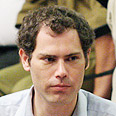


It's an appropriate message on Rosh Hashana, when we read the words of the prophet Jeremiah, “a voice is heard on high, Rachel weeps for her children, she refuses to be consoled for they are gone. Thus, says the Lord, ‘Restrain your voice from weeping, the children will return to their borders.’”
The midrash (commentators) gives context to these verses. Rachel, unlike the other matriarchs and patriarchs who were buried in the Cave of Machpela in Chevron, was buried on the road so that she could cry out to God on behalf of Israel when they would be exiled.

How we wish they were here
One wonders: Rachel was Jacob’s favorite wife. Why wasn’t she buried there in Chevron where the other matriarchs and patriarchs lie? Didn’t she have a right to be buried with her husband regardless of the needs of her children for her prayers? Doesn’t her right supersede the rights of her children?
No word for 'right'
In classical Judaism there is no Hebrew word for a right. In contrast, there are many Hebrew words for responsibility - such as achrayut. Judaism is a faith community of responsibility, rather than rights. Of the 613 mitzvot, none deal with personal rights. Rather, the mitzvot deal with responsibilities to God, to our fellow person, to the community, to Am Yisrael, to all humanity.
Rachel did have the right to demand burial in the Cave of Machpelah in Chevron. But she had the responsibility to be there for her children. And, Judaism insists, responsibility comes first.
This idea is very un-Western. In western culture, people demand rights. John F. Kennedy tried to change that culture by urging Americans not to ask what America can do for them, but what they could do for America.
Every business, profession, synagogue and institution should each have a credo. If the credo begins with how one can profit, it will inevitably fail. But if it begins by defining responsibility to the community it has a far greater chance to succeed.
The great irony is, if one demands only rights, those rights are most often not achieved. But if one outlines responsibility, from holding fast to those responsibilities, rights will follow.
It's all about responsibility
Rachel rightfully takes her place as the caring matriarch of Israel because she understood the responsibility to her people, she grasped the message of achrayut.
Not coincidentally, the theme of the campaign to bring the kidnapped soldiers home is veshavu vanim ligvulam, Jeremiah’s response to Rachel’s weeping. Rachel is promised that her requests will be fulfilled because she accepted her responsibility to her children. She understood her responsibility and we must understand ours.
While there is a tradition that Rachel, and Rachel alone was the only Biblical personality who cried on behalf of Israel, the opposite seems to emerge from the text. Rachel was not the only one who refused to be comforted for her lost children.
The fatherly reaction of Jacob when his children try to comfort him about the loss of his favorite son Yosef is described in identical language - Va-yima’en le-hitnahem. Additionally, as Rachel’s children who are gone are referred to as ki einehnu, so too, is Yosef referred to with similar wording - Yosef einehnu.
Rachel does not cry alone; Jacob cries with her. And as Jacob cries with Rachel, so should we plead and demand together with her. Only when Am Yisrael joins with Rachel in assuming responsibility will the prophecy of veshavu vanim ligvulam become a reality.
Bring them home
Beneath the pictures of the kidnapped soldiers are the words, “have them in your prayers, have them in your heart.”
It’s the message of our entire people fulfilling the Israeli motto of not abandoning soldiers in the battlefield. It’s the message of tens of thousands at a recent demonstration in Israel on behalf of the kidnapped soldiers who rallied behind the song entitled Habaytah - bring them home.
At that rally held in Tel Aviv, Karnit Goldwasser, wife of Udi (Ehud), read a letter that she wrote to her husband.
“Love of my life, soon on Oct. 14th we will be celebrating our first anniversary. I’m waiting for you, here, in our small house that we’ve just started to build. And wish to add to it a small little love to the great and strong love that we have together. I want to be together with you. You have no idea how much I yearn for this. To you, forever. Me (Ani).
And us (Anachnu). Only then, will they be free.
Rabbi Avi Weiss is founder and dean of Yeshivat Chovevei Torah Rabbinical School, Senior Rabbi at the Hebrew Institute of Riverdale, and national president of AMCHA - the Coalition for Jewish Concerns















